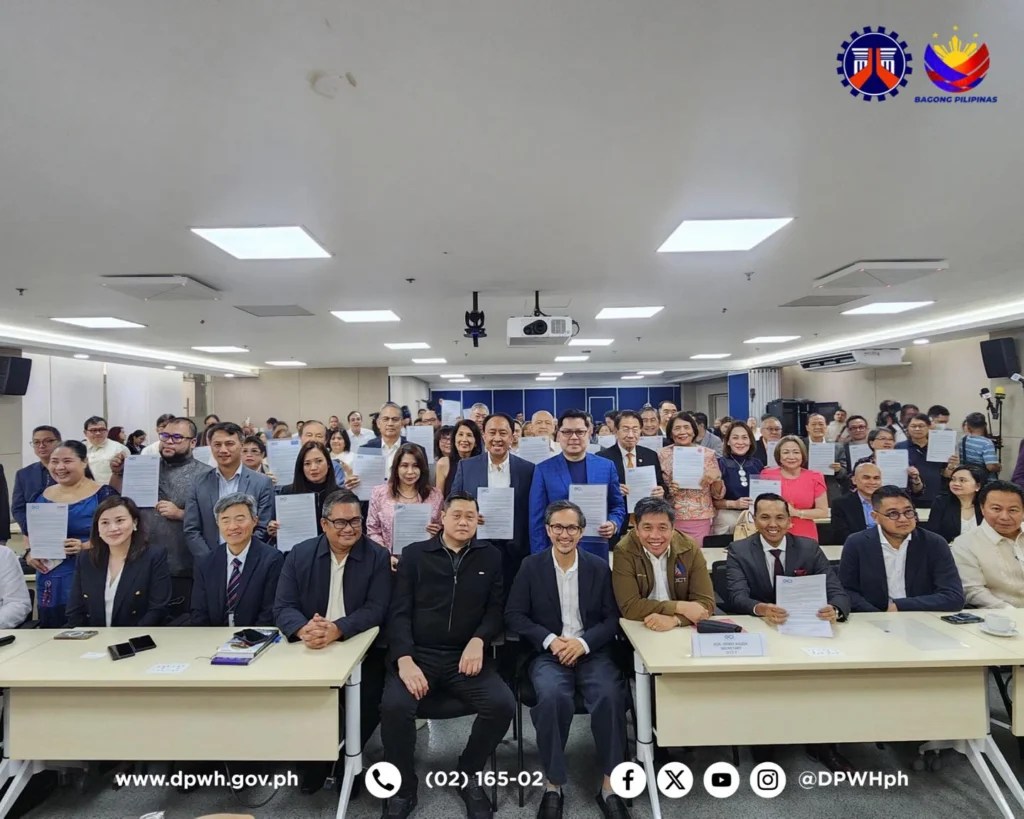The Blockchain Council of the Philippines (BCP), a non-stock, non-profit organization of blockchain professionals and advocates, has formally partnered with the Department of Public Works and Highways (DPWH) to roll out Integrity Chain, a blockchain-powered platform designed to embed transparency, accountability, and public trust into national infrastructure projects.
Through a Memorandum of Agreement signed on September 30, BCP President Dr. Donald Patrick Lim and DPWH Secretary Vince Dizon committed to digitizing and securing data on budgets, procurement processes, and construction milestones on an immutable blockchain ledger accessible to the public.
“By placing our foreign-assisted projects—those funded by Official Development Assistance (ODA)—on the Integrity Chain, we welcome the scrutiny of the private sector, academe, and civil society. This is DPWH’s strong response to the President’s directive to ensure transparency and accountability is enforced for its projects,” Dizon said.
“On behalf of the President, on behalf of the entire Cabinet, on behalf of the entire government, thank you for this, because this is really where what we should all do. From the budget process to the procurement process, to the award of the contract, to the implementation of the project, to the monitoring of the project, to the payments made to the contractors, to the acceptance of the project. Everyone should be watching now, everyone,” he added.

‘Everyone should be watching now’
The department explained that the Integrity Chain initiative is designed to track project spending and progress through a real-time public dashboard, while enabling citizen feedback, anomaly reporting, and tamper-proof records to deter corruption.
“For the first time, the private sector isn’t just demanding integrity—we’re building the infrastructure to deliver it,” Lim said.
As part of the pilot, BCP will provide DPWH with a one-year complimentary subscription to Integrity Chain, including technical support, training, and cybersecurity measures in full compliance with the Data Privacy Act of 2012.
The launch at the Asian Institute of Management (AIM) drew participation from major international development and lending agencies, including the Japan International Cooperation Agency (JICA), Korean Eximbank, Asian Development Bank (ADB), and the World Bank’s Road Transport and Country Operations. These institutions are funders of the DPWH’s flagship “Build Better More” projects under the Unified Project Management Office (UPMO) Clusters, which will be the first to be recorded on-chain.
Back to the top ↑
‘Change shouldn’t wait for politics or budgets’
BayaniChain Ventures (BYC), the platform developer, is spearheading the deployment.
“The signing with Department of Public Works and Highways and launch of Integrity Chain, led by the Blockchain Council of the Philippines, reflects everything we stand for,” Gelo Wong, Co-Founder and Chief Growth Officer of BYC Ventures, said in a LinkedIn post.
“For too long, corruption has burdened our people, eroded trust, and left communities behind. BYC (BayaniChain Ventures) was built to prove that technology can serve the people first. Integrity Chain’s first phase with DPWH’s PHP500 billion ($8.6 billion) Foreign Assisted Programs is launching at ZERO cost to government, funded by us and NGOs, because change shouldn’t wait for politics or budgets,” he said.
“Every move we make asks one question: how will this impact the people? Today, we take another step toward making accountability a system.”

Back to the top ↑
Guardrails of accountability
Lim framed the system as a safeguard. A Bitdigest report quoted Lim saying that for too long, public works have suffered from leakages, falsified milestones, and tampered records. He said that by anchoring every peso and every project on a ledger verified by many and not hidden by a few, the group is building the guardrails of accountability.
Governance Consultant Ida Tiongson added, “Blockchain is governance by design. It has accountability and transparency at its core, and this is exactly what the country needs. Integrity Chain takes these principles and makes them operational in government, ensuring that every project has the safeguards that citizens demand.”
Technical foundation
BYC Ventures CEO Paul Soliman explained the infrastructure underpinning the project, saying, “By leveraging blockchain through Lumen and Prismo, we are not just digitizing records, we are securing trust. Every budget release, contract, and milestone logged here cannot be altered or erased. For the first time, DPWH projects will be open to civic validation and citizen verification.”
Wong, meanwhile, described the broader scope: “What we are launching with DPWH is not just for one agency. This is progress that opens the door for other departments, regulators, and local governments to adopt blockchain as the backbone of accountability.”
Back to the top ↑
Blockchain as deterrent to tampering
The initiative follows recent controversies on the alleged corruption involving flood control projects.
“In the context of the ongoing flood control probe, blockchain would not only have preserved the integrity of DPWH’s documents, but also given investigators and citizens transparent access to the original, untampered versions,” Wong said in an ABS-CBN interview.
“Every budget allocation, procurement contract, and flood control project record could have been time-stamped, immutable, and verifiable by anyone with access. Instead of relying on physical files that can be misplaced or intentionally removed, blockchain ensures a permanent, tamper-proof ledger of government records,” he added.
Back to the top ↑
Watch: The Philippines is at the forefront of blockchain tech adoption
title=”YouTube video player” frameborder=”0″ allow=”accelerometer; autoplay; clipboard-write; encrypted-media; gyroscope; picture-in-picture; web-share” referrerpolicy=”strict-origin-when-cross-origin” allowfullscreen=””>
Source: https://coingeek.com/philippines-dpwh-aims-to-fight-graft-with-blockchain/